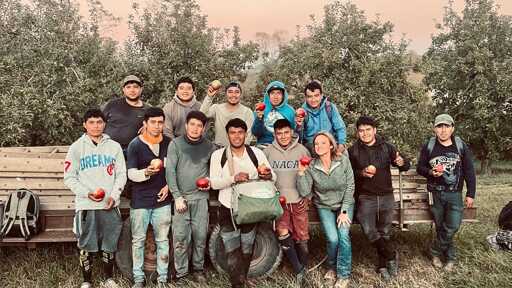Every year, I stand in my family’s orchards, worrying if we’ll have workers to pick the 6 million pounds of apples or if they will rot on the trees.
oh really? your laborers worry every day about having enough to fucking eat. fuck you
One easy trick to attract labour in a market: raise the wage of labour.
in this article, a plantation owner laments how their production system’s dependence on imperialism, mass drudgery, and artificially cheap labor is being threatened by overly aggressive white nationalism as the boomerang of oppression collides with their fiefdom.
Finding enough people to fill positions on U.S. farms is nearly impossible. I try to hire domestic employees from the community, but the reality is farm work is physically demanding and requires long hours. Americans clearly don’t want farm jobs, or they’re looking for a job that lasts longer than a season. On the rare occasion they do apply, few decide it’s the right fit for them and most resign quickly.
just spitballing, but i wonder if what’s impossible is to equitably fill the labor needs of production system centering the ownership and control a single family running a massive monoculture relying entirely on a seasonal, transient workforce.
or they’re looking for a job that lasts longer than a season.
what insane expectations these fat americans have, to have a stable job so you can uh… live. it’s clearly the immigration policy that’s the problem here.
just reading your quoted line and parsing it as “Americans clearly don’t want jobs that destroy their bodies but also offer no security”. Wild, right?
just spitballing, but i wonder if what’s impossible is to equitably fill the labor needs of production system centering the ownership and control a single family running a massive monoculture relying entirely on a seasonal, transient workforce.
Yeah, maybe a coop ownership or something crazy like that would work… Also tho, how would the family whose owned it for generations be able to put themselves in a pedestal if they can’t claim they are the sole creator of jobs and corn for the region?
just spitballing, but i wonder if what’s impossible is to equitably fill the labor needs of production system centering the ownership and control a single family running a massive monoculture relying entirely on a seasonal, transient workforce.
Straight up communal situation is the only wayt that makes sense to me. The orchards are owned collectively and the community gets together during harvest season to do the work. The harvest is sold and the revenue goes to the community’s coffers to pay for things like community housing or the community grocery store to subsidize costs and keep retail prices low to zero.
In situations where the local community can’t get enough labor together is where it might become a problem. Are there other communities with orchards that can spare their people to come help or is there a way to ethically maintain an itenerant work force to fill the gaps? National Guard or military Reserves being activated to be workers would be

for sure. treat it as a communal resource and then re-orient the production system towards the labor capacity and desires of the community. that probably is going to involve diversifying the land use to distribute the labor needs of harvest/post-harvest processing more broadly throughout the year instead of spiking it in the fall for the harvest of a single species of perennial. if the community wants to continue to “corner the [nearby] market” for apples and apple products, they will have to summon the effort within themselves.
otherwise, its time to start transitioning infrastructure and production areas into things like maybe strawberries/honey (summer), early greens (late spring), and maple tapping (winter).
the cultural logic of monoculture plantations is an anathema to community food systems/labor provisioning as much as it to ecological resilience. people who want to hang onto them will find themselves defending heinous practices out of “necessity”.
Assume an apple wholesale price of $1/lb. A typical worker can pick 12,000 pounds of apples a day, for which they are paid $250.
Hey lady, maybe these jobs would be easier to fill if you offered to share more than 2% of your revenue with your workers.
250 bucks a day is twice what I make a day working at a grocery store stocking those apples to the shelves.
I am confident in saying that it isn’t an issue of “not paying the employees enough”. The job is physically gruelling in ways that most people can’t do long term. And I’m also very confident that the supervisors/managers are not going to be the easiest people to get along with in this type of work environment.
The only real answer might be to put more people to work in the agricultural sector to do the same amount of work, letting everyone have shorter shifts (will never happen under capitalism, of course).
Revenue sharing paid out to the workers by the hours they work might be acceptible.
Paying a person by the number of bins they fill in a day creates a situation were every worker is in direct competition with each other seems… not great in the long term for the harvest workers in general.
A single person being able to fill 15 bins in a day might not want to lose pay by only filling 10/11/12 bins and leaving the other apples for other workers. Other workers are then cut out of being able to make as much as there are less apples for them to pick. Feedback loop kicks in where new apple pickers can’t “get gud” fast enough to poach apples from that one asshole who can pick 15 bins worth in a day so fewer and fewer people can view this seasonal work as actually worth while.
Capitalism is a shit.
The real answer is you just get a machine to do it and so like 10 guys on shifts pick all the apples, with the machine.
picking fruit is very much a non-trivial automation problem
If I stick to example given here of apple picking that’s a solved problem.
I couldn’t have said it better myself. All attempts so far at automating apple picking for the grocery market have failed. Probably the biggest recent advancement is having pickers stand on tiered platforms that get slowly pulled along by a small tractor. The hottest new tech is using a vacuum system and a rotary airlock valve to eliminate workers’ time spent dumping bags into bins. It’s still all about having people grab the fruit off the tree in even the very highest of high tech operations.
I think it’s more about getting paid for more than the 1 month a year that this work is available. So we could solve it by just paying someone a whole year’s salary in a month, then they’d get a lot of applicants. But the farmers want to only pay people for that month, hope they survive in some other way for 11 months, and that they happily come back at the end of that to work for a month again. It’s capitalism running into a constraint built by weather and finding out that the only solution is slavery or socialism
But the farmers want to only pay people for that month
Pretty sure the orchard operators don’t get prepaid for their apples either so they’re put into a situation of paying their workers from money saved from the previous year’s harvest or through taking out loans. Somebody else besides the farm operator is going to have to foot the bill for paying each worker 20~25k a year US for a month’s work.
It’s worth noting that workdays are typically longer than 8 hours and don’t include benefits, and (as other users have noted) are only seasonally available and may require extensive travel.
There are many cases of vertical integration, but apples that make it to a grocery store in the US are typically sold four times: by the grower to a packer, by the packer to a distributor (often through a marketing company), by the distributor to the retailer, and finally by the retailer to the consumer. The first three sales could all be considered wholesale deals. It is true that pickers receive far too little money for their labor, but your figure of $1/lb at any of these wholesale points is too high. You can look at current spot prices for packer-to-distributor sales here. These prices are listed mostly by the carton, which are about 40lbs typically. Prices at this point do go over $1/lb occasionally for high grades of certain varieties, but keep in mind that this price is after the packing house has taken their cut.
Fair enough, but I think even with a $0.50 spot price we’re looking $3 million in gross revenue, of which the workers can be expected to receive roughly $125,000. Other inputs, like fertilizers, pesticides, herbicides, mulch, etc. don’t grow on trees and can get expensive, and a quick google suggests the farmer’s margin is anywhere from 10-35%, so it’s possible Pryor is taking home the high six figures from these trees.
Hey I just like talking about the price of tree fruit. It’s never boring, that’s for sure. I couldn’t tell you exactly what kind of money growers are making. Enough to have a lobby in Congress I guess.
Mulch does grow on trees, it is trees. Fertilizer and herbicides mostly get used on annual crops.
I would estimate that the picking labor is close to ½ of all the production labor for apples, though. Source: I worked on an apple orchard once.
At a conservative picking estimate from the article of 10,000 pounds a day, or $5000 of product realized at the end of production, we would have maybe $2000 in property tax and vehicle operating costs and pesticides combined, then 12 labor hours that went into planting, straightening, weed-eating, deploying pesticides on, and pruning the apple trees for the 8 hours it took to pick them clean. It’s still 20 labor hours for $3000 of product.
But 12k pounds a day is insane. IIRC it was a good day if I managed 1000 pounds an hour.
I almost feels like the US is soft launching the idea of bringing back Okies. What the fuck else are we supposed to do with this massive population of jobless/unable to afford even basic housing people?
I’ll probably be picking peaches in Napa while living in a panel van by this time next year.
Increased incarceration and deportation probably go hand in hand with the foreseen labor surplus.
美国百年国耻
only the beginning











